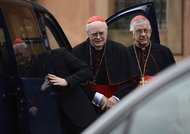Vatican Says Conclave to Elect New Pope Will Begin Tuesday
By Daniel J. Wakin and Alan Cowell
For days, speculation has been feverish about when they would begin their conclave. They made their decision shortly after beginning the latest of their regular meetings, at 5 p.m. local time, with the news transmitted by an e-mail from the Vatican press office. So on Tuesday afternoon, the princes of the Catholic church will file into the Sistine Chapel and begin secret, anonymous balloting for a successor to Benedict XVI, who said the transition in motion by resigning the papacy on Feb. 28, the first pope to do so in nearly 600 years. Since Monday, the cardinals have been meeting daily in a Vatican auditorium for meetings prescribed by the rules governing papal transitions. A few more than 100 of the 150 or so cardinals present have given short speeches about the state of the church and what is needed in the next pope, a subtle form of politicking and auditioning. Another session was scheduled for Saturday. Vatican analysts and Vaticanisti, those journalists who cover the Holy See and papal matters with a close eye, have theorized about the significance of the congregation’s length. One view is that Italian cardinals and insiders wanted to move quickly to a conclave to stave off too much scrutiny of the scandals that have washed over the Vatican in recent months. Another is that outsiders and foreign cardinals feel the need to explore questions of corruption and mismanagement more deeply. But other factors are at play. The congregation meetings are the last opportunities for cardinals 80 and above — who are not eligible to vote in the conclave — to voice their views publicly about the church’s direction and the kind of pope who should lead it. A more prosaic cause for the timing of the conclave announcement is an interpretation of Vatican rules on declaring a conclave that requires all the elector cardinals to be present to do so. The last, Cardinal Jean-Baptiste Pham Minh Man, arrived only on Thursday. The formal discussions have not been focused according to subject matter. The cardinals speak in the order of their requests. Normally, the conclave should start 15 to 20 days after the end of a papacy, a period intended to include preparations for a papal funeral and for mourning. But Benedict, in the days before he stepped down, revised the rules to allow an earlier start. The Tuesday start date allows for the cardinals to elect and install a pope from their ranks well ahead of the busy Easter week, which begins on March 24 with Palm Sunday, seven days before Easter itself. Two of the 117 cardinals under 80 are not attending. They are Cardinal Julius Riyadi Darmaatmadja of Indonesia, who cited ill health, and Keith O’Brien of Scotland, who said he would not be attending after being accused of “inappropriate acts” with priests. He later acknowledged committing sexual misconduct. On Friday, the cardinals voted to accept the reasons given for the two absences, as they are required to do. The vote was a reminder of the need to choose a pope who is untainted by improprieties. “They’re very concerned about getting somebody clean,” said Robert Mickens, the Vatican correspondent for The Tablet, a London-based Catholic weekly. “The O’Brien scandal is right in their faces,” he said. There are no clear front-runners, but some cardinals hinted earlier in the week that they believe the church needs a compelling communicator who wins souls through his words and his holy bearing, and a strong-minded administrator who can tackle the disarray and scandal in the Vatican. Benedict, 85 when he retired, was elected on the fourth round of voting in 2005 — a day after the conclave began — while his predecessor, John Paul II, emerged as pope after a conclave lasting from Oct. 14 to 16, 1978. No conclave since the early 20th century has lasted more than five days.
|
.
Any original material on these pages is copyright © BishopAccountability.org 2004. Reproduce freely with attribution.
